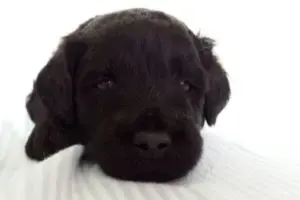(Updated 05/15/2021) Goldendoodles are always in high demand due to their adorable fluffy looks and their happy go lucky charm. But people who are looking for Goldendoodles also want a dog that does not shed.
So a common question about the Goldendoodle is Do Goldendoodles shed?
You will find a lot of different answers to this question, but the correct answer is maybe.
That’s because there are a lot of different factors that go into determining if a Goldendoodle will shed and how much.
Just being part poodle does not guarantee that your Goldendoodle will not shed.
Join us as we go over why dogs shed and why some Goldendoodles appear like they do not shed.
Why Dogs Shed
Dog’s shed their fur for a number of reasons. First it allows damaged or old hair to fall out so new hair can take its place.
Second, it assists in the seasonal coat change that double coated dogs like the Golden Retriever go through.
In the spring double coated dogs lose the heavy undercoat that kept them warm in the winter and in the fall they lose their warm weather coat to make room for their heavier winter undercoat.

All this changing of coats results in a lot of hair falling out all over your floor. Double coated dogs also shed year round, just not as much as during a coat change.
In contrast single coated dogs like the poodle do not have an undercoat to shed each season. Which means there is a lot less fur on your floor and clothes. But just like the double coated dogs, poodles do shed year round.
However, since poodles need to be brushed regularly to maintain their coats most of the loose fur ends up in the brush rather than on your floor.
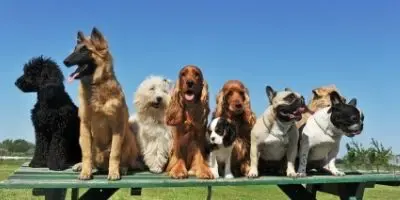
Single coat vs double coated dogs
Double coated dogs have an outer coat and an undercoat. The outer coat tends to be longer and the fur is coarse. This outer layer of fur protects dogs from the elements like the sun and things that might damage the undercoat.
The inner layer of fur is soft with a downy like quality, much like the down on a bird. This layer is to insulate a dog from the cold and heat.
Double coated dogs tend to be hardier breeds that can withstand colder temperatures.
As the name implies single coated dogs have just one coat. They lack the soft insulating layer of a double coated dog. Because of this single coated dogs may need a dog coat in the winter.
This single layer can be long or short, curly or straight. Since they don’t have a heavy undercoat to shed each season they appear to shed less, it may even look like they do not to shed at all.
How to tell if a dog has a single or double coat?
It’s easy to tell if you have a double coated or single coated dog. Just spread the fur down to the skin. If you see long, coarse fur combined with a shorter, soft fleece like fur, you have a double coated dog.
On the other hand if you find that the hairs are all the same length and you can’t see a soft undercoat they are a single coated dog.
Doodles can have a combination coat. Some parts are double coated and some are single coated.
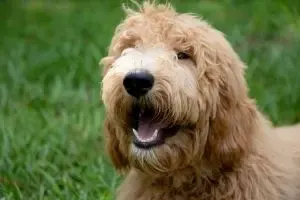
Do Goldendoodles shed?
The answer to do Goldendoodles shed is yes, at least a little. But if they are carefully bred their shedding can be kept to a minimum.
Plus, if you brush your Goldendoodle regularly the hair that does come out will be on the brush not on your floors or clothes. This makes some Goldendoodles appear to be non-shedding.
My doodle is non-shedding for the first 4 weeks after a grooming session. That’s because all of her loose fur has been washed, brushed and blow out of her during the grooming session.
Plus her hair is cut short so the fine hairs are hard to see. Once her hair starts to grow longer we begin to notice some fur in the corners of the room. But it is not even close to what our Golden Retriever use to drop weekly.
If you want a Goldendoodle that does not shed your best bet is getting a multigenerational doodle from a breeder that carefully breeds the shedding genes out of the dog. Let me explain.
Goldendoodle Generation Classifications
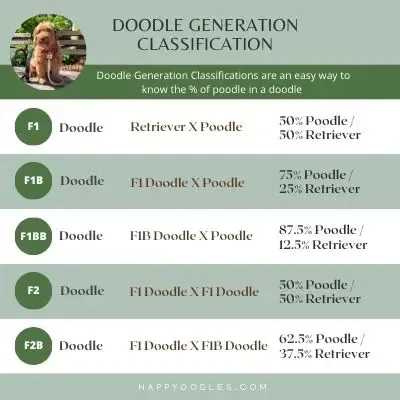
In the past a doodle’s chance of shedding was tied to their Doodle Generation Classification (as shown above).
The belief was that if you crossed a Golden Retriever (which is a heavy shedders) with a poodle (a low to non-shedder) then the resulting offspring would shed less. We now know that based on genetics this can be true.
However to get to a point that a dog does not shed (aka a low shed dog), a dog needs to inherit two non-shedding genes. One gene from each parent.
If we look at first generation Goldendoodles or F1 Goldendoodles they receive one shedding gene from the Golden Retriever and one non-shedding gene from the poodle. This results in lower shedding then a purebred Golden Retriever, but they will still shed more than a poodle.
Before genetic testing was available breeders would breed an F1 Goldendoodle to a Poodle (this is a F1b Goldendoodle) with the hope that they would inherit two non-shedding genes.
Since the F1 Goldendoodle would have one shedding gene and one non-shedding and the poodle would have two non-shedding genes, at least some of the Goldendoodles should end up with two non-shedding genes.
But the dogs also ended up with a curlier coat that closely resembled a poodle’s curls.
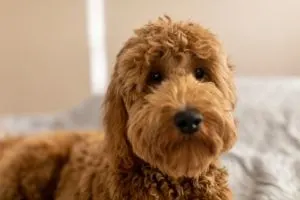
Genetics
Thanks to recent research we know that the genes that control non shedding are related to the length of hair on a dog’s face. This facial hair includes the beard and long eyebrows that doodles are known for.
So if a dog has these facial features they have at least one non-shedding gene. But since this gene is believed to be the dominant gene they can still have just one shedding gene even if they have the long facial hair.
Remember to get a low-shedding doodle they need to carry two non-shedding genes.
To ensure a dog inherits two non-shedding genes the parent dogs must also have two non-shedding genes. This is where genetic testing comes in.
By testing the dogs to see if they have two non-shedding genes breeders are able to determine which pairs will give them the desired off spring. In this case doodles that hardly shed.
Note: To make the explanation easier to understand I called the gene the non shedding gene, But that is not the correct term. The genes that are believed to control shedding and facial hair are the MC5R-gene and the RSPO2-gene. It is the combination of these two genes that make doodles what they are. At least that is today’s understanding. As new discoveries are made, there may be a new understanding about what contributes to shedding in dogs.
Not all Goldendoodles are low to no shedding
The reason why you get so many different answers to the question “Do Goldendoodles Shed” is because every Goldendoodle is different. As I mentioned above it all depends on the genes that are passed down from the parent.
F1 Goldendoodles and F1 mini Goldendoodles are more likely to shed since they inherit genes from both the poodle and Golden Retriever.
Multi generation Goldendoodles can also shed if they inherited the genes for shedding from either of their parents. The best way to find a non-shedding Goldendoodle is to buy from a breeder that test for the non-shedding genes.
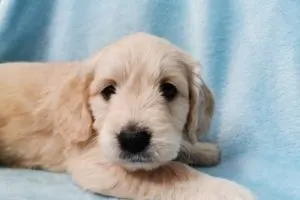
How to tell if a Goldendoodle will shed?
Outside of getting a DNA test there really is no sure way to know if they will shed or not. But if you have an adult Goldendoodle with straight fur or if they have short smooth hair on their face there is a good chance they will shed more than a poodle.
Does a Mini Goldendoodle shed less than a Goldendoodle?
Although a Mini Goldendoodle will have the same chance of shedding or not shedding as a standard sized Goldendoodle, the size difference can result in less visible shedding.
They simply have less fur to shed because of their smaller size.
Many of the standard sized doodles also can be found as mini doodles. Check out our post on Mini Doodle Dogs to learn more about them.
Are you still trying to decide which type of doodle is right for you? If so, check out our post on Goldendoodle vs Labradoodle; Which is better?
Are Goldendoodles hypoallergenic?
Before we can answer this we need to go over the definition of Hypoallergenic.
The Cambridge online dictionary, defines hypoallergenic as “designed to be less likely to cause allergic reactions“.
If you go by this definition then the Goldendoodle is hypoallergenic, since they are bred to be less likely to cause an allergic reaction in people with dog allergies. Here how.
It’s the current belief that pet allergies are caused by proteins that are found in a dog’s skin cells, saliva or urine. Often times dog allergies are triggered when a person is exposed to the dander a pet sheds.
You see when a dog sheds, there is a small piece of skin that’s attached to the end of each hair that also comes off. This small piece of skin can then become airborne.
For people who are sensitive to this protein they may have an allergic reaction when they inhale the dander.
Since Goldendoodles can be bred to shed minimally there is less chance that they will cause an allergic reaction.
But you need to find a breeder that does the genetic testing to ensure the doodle sheds minimally.
Less shedding doesn’t guarantee a doodle will be allergy friendly
Although having a low shed dog can lower the chance of an allergic reaction it does not guarantee that you will not be allergic to them.
Shedding dog dander is only one of the ways people come in contact with the protein that causes allergic reactions.
Being licked by a dog, petting them, brushing them or cleaning up after one can also expose someone to the protein.
It is best to spend time with the dog or their parents to see if you will have an allergic reaction before you bring home the dog.
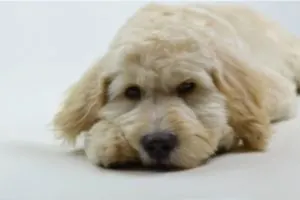
What Goldendoodles owners say about shedding?
I asked a group of doodle owners if their dogs shed to see if the claims about doodles not shedding were true. Here is what I found.
- The majority of people with a Goldendoodle stated that their dog did not shed regardless of the generation
- Only a couple of Goldendoodle parents said their doodle shed
- In general doodle parents with non-shedding dogs often had multigenerational doodles
This information was derived from a small group of people who responded to the question. It does not guarantee that the doodle you chose will not shed.
Is the Goldendoodle the right dog for you? Join us to find out why the Goldendoodle is not for everyone.
Are Goldendoodles easy to groom?
One of the most popular features of a Goldendoodle is that they shed less than other types of dogs. But Goldendoodles do need to be groomed regularly.
If a Goldendoodle is not regularly brushed the curly hair that is dropped will get mangled in with the hair that is still attached.
Add to that a dog’s natural oils and outside dirt and you have the prefect recipe for matting. If you truly want a no shedding dog you must brush them often.
This means daily brushing if you plan to keep their hair long. If you are unable to brush them daily you should choose to keep their coat short.
A Goldendoodle’s coat grows quickly requiring them to be groomed every 6 to 8 weeks. The cost to have your mini Goldendoodle professionally groomed is around $75.00.
This cost may be higher depending on where you live or how matted your dog gets.
Possible other reasons Goldendoodles shed
In addition to the natural cycle of hair growth Goldendoodles can shed more if something is off balanced with the dog. This includes such items like:
- Stress: Any dogs that are under a larger amount of stress can start to lose more hair than normal.
- Allergies: Dog skin allergies are a common reason for hair loss. Dogs with skin allergies may lick themselves bald.
- Excessive bathing: Washing your dog too much will result in removing your dog’s natural oils from their skin. This will cause their skin to dry out and may even cause them to loss their fur.
- Poor nutrition: A dog’s fur is part of their body. Inadequate nutrition can result in hair loss
- Health: There are numerous health conditions that can cause a dog to loss their hair. If your dog experiences excessive hair loss that is not part of their normal cycle make sure you bring your dog to see the veterinarian.
If you are looking for more big dogs that don’t shed check out our post; 14 Big Dogs That Don’t Shed, But Still Have Fur
Do Goldendoodles Shed Resources
- Pet allergy: Are there hypoallergenic dog breeds?; MayoClinic.org
- Hair of the Dog: Identification of a Cis-Regulatory Module Predicted to Influence Canine Coat Composition; The National Center for Biotechnology Information
- A Guide to Dog Coat Types; News.Orvis.com
- What is the difference between hair and fur?; Scientific American
- Goldendoodle Association of North America (GANA)
Are you looking for a Hypoallergenic Dog?
Here are some resources to help you with your search
- Mini Goldendoodle: Your Up-To-Date Guide for 2021
- Black Goldendoodle: What You Need to Know
- What Does A Goldendoodle Cost in 2021?
Considering getting a Doodle?
Here are some resources to help you find a rescue?

